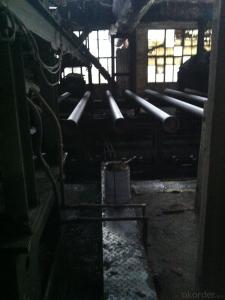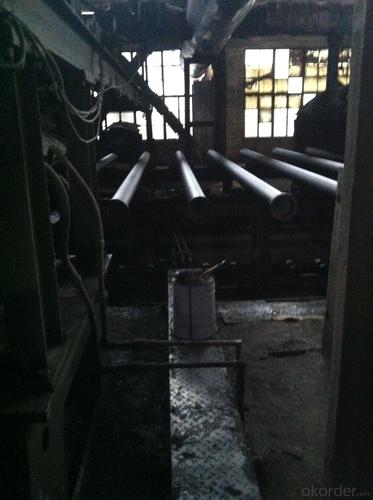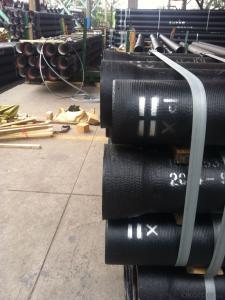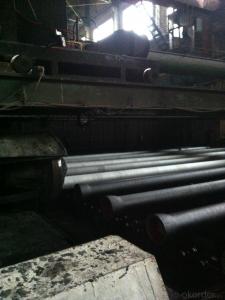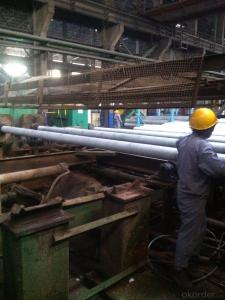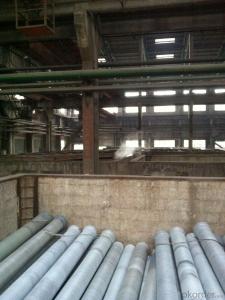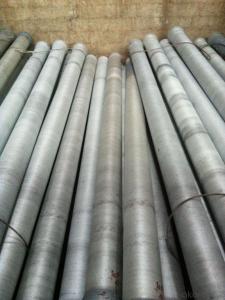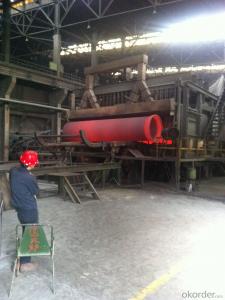DUCTILE IRON PIPE AND PIPE FITTINGS K9 CLASS DN400
- Loading Port:
- Tianjin
- Payment Terms:
- TT OR LC
- Min Order Qty:
- 20 pc
- Supply Capability:
- 3000 pc/month
OKorder Service Pledge
OKorder Financial Service
You Might Also Like
Material : Ductile Cast Iron
Size Range : DN 80mm to DN 2000mm
Unit Effective Length : 6m or 5.7m
Manufacture Standard: ISO 2531:1998/ EN 545:2006/EN 598:2007
Annual capacity : 200,000 tons
Coating Exterior: Zinc 130g/m2 according to ISO 8179-1 and bitumen coating 70 microns.
Cement Interior: Portland Cement/ High Alumina Cement/ Sulphate Resisting Cement Lining according to ISO 4179
Special requirements on external coating and internal lining can be applied
We also provide accessories such as SBR/EPDM rubber gaskets, lubricant paste, pipe caps, PE sleeves, etc.
Additional Parts:
Each pipe is strictly inspected according to related standard to ensure permanently high performance.
Easy Installation at site and service free for life
Long Service Lifespan
Quotation will arrive you within 24hours once we get your inquiry.
We guarantee offering you a competitive price.
A copy of original inspection reports of pipes will be offered after shipment.
Photos of loading process will be sent to the customer after shipment effect.
We will follow-up the delivery progress after shipment effect and update to the customer on weekly basis.
- Q: Can ductile iron pipes be used for industrial applications?
- Yes, industrial applications can utilize ductile iron pipes. Ductile iron, a form of cast iron, possesses enhanced mechanical characteristics compared to traditional cast iron. These improvements include increased ductility and strength. Consequently, ductile iron pipes are highly appropriate for industrial applications that require durability, strength, and resistance to external forces. Industrial applications often necessitate the transportation of high-pressure water or fluids. Ductile iron pipes are specifically designed to endure such circumstances. Their exceptional tensile strength enables them to withstand deformation and fractures. This quality renders them optimal for managing heavy loads and enduring significant internal and external pressures. Moreover, ductile iron pipes exhibit exceptional resistance to corrosion, rendering them remarkably suitable for industrial applications that entail exposure to harsh chemicals or corrosive substances. The pipes' resistance to corrosion ensures a prolonged lifespan and decreases maintenance expenses associated with pipe replacements or repairs. Furthermore, ductile iron pipes are renowned for their adaptability and versatility. They can be seamlessly connected and integrated into existing infrastructure, making them the preferred choice for industrial applications. The pipes' impressive strength-to-weight ratio facilitates easy handling and installation, a crucial aspect in industrial settings. In conclusion, ductile iron pipes are well-suited for industrial applications due to their enhanced mechanical properties, corrosion resistance, and versatility. Their ability to endure high pressures, resist deformation, and adapt to existing infrastructure establishes them as an exceptional choice for various industrial applications.
- Q: Are ductile iron pipes suitable for use in paper mills?
- Yes, ductile iron pipes are suitable for use in paper mills. Ductile iron is known for its high strength and durability, making it an excellent choice for various industrial applications, including paper mills. These pipes can withstand high-pressure systems and are resistant to corrosion, making them suitable for transporting water, chemicals, and other fluids commonly used in paper mills. Additionally, ductile iron pipes have good impact resistance, which is beneficial in an environment where heavy machinery and equipment are often present. Overall, ductile iron pipes are a reliable and long-lasting option for paper mills due to their strength, durability, corrosion resistance, and ability to handle high-pressure systems.
- Q: How does ductile iron pipe perform in seismic areas?
- Ductile iron pipe performs exceptionally well in seismic areas due to its inherent strength and flexibility. Seismic activity can subject pipelines to significant ground movements and vibrations, and ductile iron pipes have proven to be highly resilient in such conditions. The unique properties of ductile iron, including its high tensile strength and ductility, allow it to absorb the energy generated during seismic events. This ability to flex and bend without breaking or fracturing makes it an excellent choice for areas prone to earthquakes. Furthermore, ductile iron pipes are designed and manufactured to withstand external forces and ground movements. They are often installed with flexible joints that can accommodate ground shifts and maintain the integrity of the pipeline system. These joints can absorb lateral and angular movements, reducing the risk of pipe failure. Additionally, ductile iron pipes have a long history of successful performance in seismic areas. They have been extensively tested and proven to meet or exceed industry standards for seismic resistance. This reliability is crucial in ensuring the safety and functionality of water and wastewater systems, even in the event of a seismic event. Overall, ductile iron pipe is a reliable and durable choice for pipelines in seismic areas. Its ability to withstand ground movements, its flexibility, and its proven track record make it an excellent option for ensuring the integrity and functionality of water and wastewater systems in earthquake-prone regions.
- Q: How is ductile iron pipe installed?
- The installation of ductile iron pipe can be carried out using two different methods: trenchless technology or the open-cut method. When utilizing trenchless technology, a hole is drilled into the ground, and hydraulic jacks or winches are used to push or pull the ductile iron pipe into the hole. This approach minimizes disruptions to the surrounding environment and reduces the need for extensive excavation. On the other hand, the open-cut method involves excavating a trench to the necessary depth and width for the ductile iron pipe. The trench is then prepared by removing any debris or obstructions and ensuring a stable base. The pipe is subsequently lowered into the trench and aligned correctly with the assistance of laser or surveying equipment. Once the pipe is in place, joints are connected using either a rubber gasket or mechanical joint. The joints are carefully sealed to prevent any leakage. Backfill material is then meticulously placed around the pipe, ensuring proper compaction for stability and support. To avoid excessive settlement, the backfill is applied in layers. After completing the installation, the pipe undergoes testing to ensure its integrity. This may involve hydrostatic testing, where water is filled into the pipe and monitored for any signs of leakage or pressure loss. Overall, the installation of ductile iron pipe necessitates careful planning, excavation, alignment, joint connection, backfilling, and testing. It is crucial to adhere to industry standards and guidelines to achieve a successful and reliable installation that meets the required specifications.
- Q: How do ductile iron pipes handle heavy traffic loads?
- Ductile iron pipes possess exceptional durability and have the ability to effortlessly withstand heavy traffic loads. This is primarily attributed to their remarkable strength and flexibility. The incorporation of graphite nodules in the composition of ductile iron allows for greater flexibility compared to traditional cast iron pipes. This enhanced flexibility empowers the pipes to endure substantial traffic loads, including the weight of vehicles traversing over them. Moreover, ductile iron pipes exhibit an elevated load-bearing capacity, enabling them to bear significant weights without experiencing any deformation or structural failure. Consequently, they are well-suited for deployment in areas characterized by heavy traffic, such as highways, bridges, and industrial sites. Furthermore, ductile iron pipes showcase exceptional resistance to external forces, such as vibrations and impacts. These pipes can effectively absorb and distribute these forces across the entire pipe network, thereby averting any potential damage and preserving the overall structural integrity. In conclusion, ductile iron pipes are explicitly engineered to manage the demands imposed by heavy traffic loads. Their strength, flexibility, and load-bearing capacity render them a dependable choice for infrastructure projects where durability and longevity are of utmost importance.
- Q: Are ductile iron pipes resistant to microbiologically induced corrosion?
- Yes, ductile iron pipes are highly resistant to microbiologically induced corrosion. The unique composition and structure of ductile iron make it less susceptible to the growth of microorganisms and the subsequent corrosion caused by them. Additionally, the protective oxide layer that forms naturally on the surface of ductile iron pipes provides an extra layer of defense against microbiological corrosion.
- Q: Will nodular cast iron pipes rust?
- Qualified ductile iron pipe requires lining standard cement. The outer wall of pipe needs spraying zinc treatment and asphalt paint coating, and other epoxy resin paint can also be selected. Qualified ductile iron pipes can be used for more than a hundred years. The main place where rust is easily exposed is where the outer wall meets the soil because of its high humidity and high oxygen content. Qualified anticorrosion can effectively resist rust, its process principle can not give you the details.
- Q: Can ductile iron pipe be used for pump stations?
- Certainly, pump stations can utilize ductile iron pipe. Ductile iron pipe is extensively employed in underground water and wastewater systems, including pump stations. It provides numerous benefits, including remarkable strength, durability, and resistance to corrosion, thus ensuring its appropriateness for such purposes. Moreover, ductile iron pipe seamlessly harmonizes with various pump types and is renowned for its extended lifespan, rendering it an optimal selection for pump station projects.
- Q: Can ductile iron pipes be used for water treatment facilities?
- Yes, ductile iron pipes can be used for water treatment facilities. Ductile iron pipes are known for their strength, durability, and corrosion resistance, making them suitable for transporting water in various treatment processes such as filtration, disinfection, and distribution. Their ability to withstand high pressures and external loads makes them a reliable choice for water treatment facilities.
- Q: Can ductile iron pipes be used for irrigation pivot systems?
- Indeed, irrigation pivot systems can utilize ductile iron pipes. Renowned for their robustness, longevity, and resistance to corrosion, ductile iron pipes are apt for numerous purposes, including irrigation. These pipes have the capability to withstand substantial water pressure, guaranteeing a dependable and enduring means of transporting water to irrigation pivot systems. Moreover, ductile iron pipes harmonize seamlessly with a variety of fittings and connectors commonly employed in irrigation systems, thereby facilitating effortless installation and upkeep. All in all, employing ductile iron pipes in irrigation pivot systems emerges as a pragmatic decision that ensures efficacious water distribution while minimizing the likelihood of pipe failure.
Send your message to us
DUCTILE IRON PIPE AND PIPE FITTINGS K9 CLASS DN400
- Loading Port:
- Tianjin
- Payment Terms:
- TT OR LC
- Min Order Qty:
- 20 pc
- Supply Capability:
- 3000 pc/month
OKorder Service Pledge
OKorder Financial Service
Similar products
Hot products
Hot Searches
Related keywords
